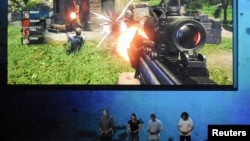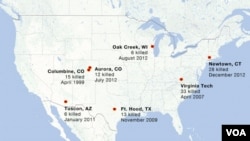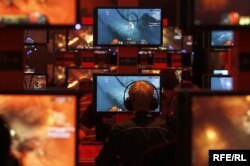The rampage that killed 26 children and teachers at Connecticut’s Sandy Hook Elementary School last month has triggered a backlash against the prevalence of guns and violent video games in America – a reaction that experts say is natural in times of distress.
Connecticut police say 20-year old Adam Lanza used a Bushmaster AR-15 semi-automatic assault-type rifle to kill the children and teachers Dec. 14. Before the attack, Lanza reportedly spent hours playing violent online games on his computer.
A week after the shootings, the executive vice president of the National Rifle Association rejected any suggestions that the widespread prevalence of guns in American society was to blame for the Connecticut shootings and others before it. Instead, said the NRA’s Wayne LaPierre, the culprit was the video game industry, which “sells, and sows, violence against its own people.”
Now, a Connecticut group has begun collecting and disposing of violent video games to save kids from what it said is their unhealthy influence.
Not everyone is convinced this will be effective.
“Before it was books, it was comic books. It was television. It was radio. It was any number of things in our culture where they [i.e., people] reflect violence,” said Kamy Akhavan, president of ProCon.org, a California-based non-profit educational research group.
“We live in a violent culture,” he said. “But whether [or not] video games are the cause is absolutely subject to debate.”
Akhavan said technology has made video game violence more realistic, blurring the line between reality and fantasy. Even so, he said most people are able to distinguish between the two.
About 97 percent of 12 to 17-year old kids in America play video games and, according to Akhavan, juvenile violent crimes have declined from around 1995 to the present even as video game sales quadrupled.
And Chris Ferguson, chairman of the Department of Psychology and Communication at Texas A&M International University, noted that not all the killers in recent incident were video game players.
Ferguson said the mass killers in recent incidents tended to be anti-social or suffer from mental health problems. He said such people tend to react to “what they perceive as a major loss in their life” – things that are “tangible and practical” instead of what goes on in a fictional universe.
“Exposure to the kind of fictional violence you see in movies or television just doesn’t have the right kind of emotional impact to trigger violence in individuals, whether they have a predisposition or not,” said Ferguson.
He said there are two different groups of individuals – people who like the video games and people who like guns. And he suggested that the NRA is trying to distract people by talking about video games rather than gun violence.
The NRA did not respond to several requests to comment on the issue.
But Dave Workman, communications director for the Citizen’s Committee for the Right to Keep and Bear Arms, said the acts of a lone man in Connecticut should not be used in an attempt to justify taking away guns from millions of peaceful gun owners.
He noted that millions of video game players don’t commit crimes just as “millions of law-abiding gun owners who own the same kind of firearm [used in the Connecticut shootings] and they didn’t commit any crimes with those guns.“
“They shouldn’t be penalized for the act of an individual,” Workman said. “And their guns shouldn’t be demonized simply because somebody picks one of them up and misuses it in a crime.”
Workman accused critics of gun ownership of going after firearms whenever a “high-profile but rare incident” like the Connecticut shootings takes place. And any ban on firearms, he predicted, would be ineffective.
“You cannot guarantee, no matter what you put in place, that a criminal or a madman is not going to be able to get his hands on a firearm,” he said.
Regardless of where the finger of blame is pointed, said Texas A&M’s Ferguson, it is important not to be distracted by “something that is not going to be very helpful, whether it’s video games or movies or whatever else.”
“During a time of emotional crisis like this, after such a tragic shooting, it’s very, very natural … to kind of grasp around and look for some sort of answer,” Ferguson concluded.
Connecticut police say 20-year old Adam Lanza used a Bushmaster AR-15 semi-automatic assault-type rifle to kill the children and teachers Dec. 14. Before the attack, Lanza reportedly spent hours playing violent online games on his computer.
A week after the shootings, the executive vice president of the National Rifle Association rejected any suggestions that the widespread prevalence of guns in American society was to blame for the Connecticut shootings and others before it. Instead, said the NRA’s Wayne LaPierre, the culprit was the video game industry, which “sells, and sows, violence against its own people.”
Now, a Connecticut group has begun collecting and disposing of violent video games to save kids from what it said is their unhealthy influence.
Not everyone is convinced this will be effective.
“Before it was books, it was comic books. It was television. It was radio. It was any number of things in our culture where they [i.e., people] reflect violence,” said Kamy Akhavan, president of ProCon.org, a California-based non-profit educational research group.
“We live in a violent culture,” he said. “But whether [or not] video games are the cause is absolutely subject to debate.”
Akhavan said technology has made video game violence more realistic, blurring the line between reality and fantasy. Even so, he said most people are able to distinguish between the two.
About 97 percent of 12 to 17-year old kids in America play video games and, according to Akhavan, juvenile violent crimes have declined from around 1995 to the present even as video game sales quadrupled.
And Chris Ferguson, chairman of the Department of Psychology and Communication at Texas A&M International University, noted that not all the killers in recent incident were video game players.
Ferguson said the mass killers in recent incidents tended to be anti-social or suffer from mental health problems. He said such people tend to react to “what they perceive as a major loss in their life” – things that are “tangible and practical” instead of what goes on in a fictional universe.
“Exposure to the kind of fictional violence you see in movies or television just doesn’t have the right kind of emotional impact to trigger violence in individuals, whether they have a predisposition or not,” said Ferguson.
He said there are two different groups of individuals – people who like the video games and people who like guns. And he suggested that the NRA is trying to distract people by talking about video games rather than gun violence.
The NRA did not respond to several requests to comment on the issue.
But Dave Workman, communications director for the Citizen’s Committee for the Right to Keep and Bear Arms, said the acts of a lone man in Connecticut should not be used in an attempt to justify taking away guns from millions of peaceful gun owners.
He noted that millions of video game players don’t commit crimes just as “millions of law-abiding gun owners who own the same kind of firearm [used in the Connecticut shootings] and they didn’t commit any crimes with those guns.“
“They shouldn’t be penalized for the act of an individual,” Workman said. “And their guns shouldn’t be demonized simply because somebody picks one of them up and misuses it in a crime.”
Workman accused critics of gun ownership of going after firearms whenever a “high-profile but rare incident” like the Connecticut shootings takes place. And any ban on firearms, he predicted, would be ineffective.
“You cannot guarantee, no matter what you put in place, that a criminal or a madman is not going to be able to get his hands on a firearm,” he said.
Regardless of where the finger of blame is pointed, said Texas A&M’s Ferguson, it is important not to be distracted by “something that is not going to be very helpful, whether it’s video games or movies or whatever else.”
“During a time of emotional crisis like this, after such a tragic shooting, it’s very, very natural … to kind of grasp around and look for some sort of answer,” Ferguson concluded.







